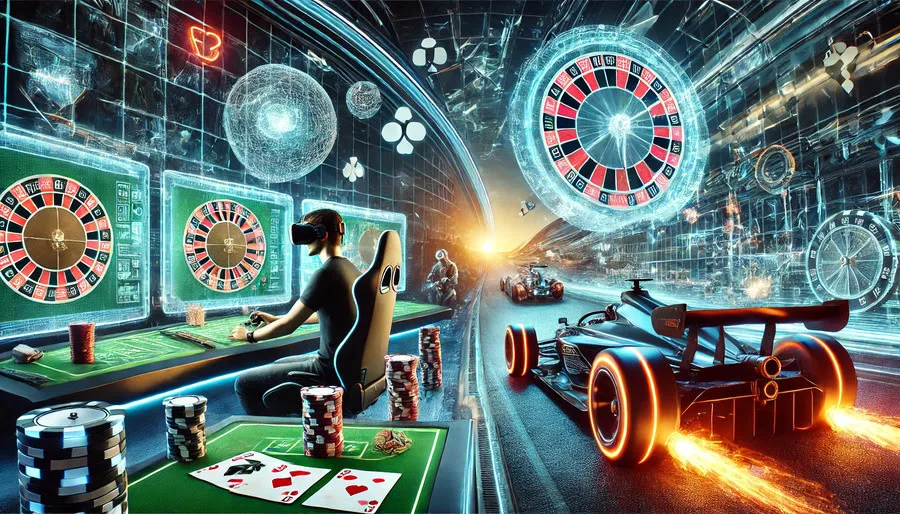How Virtual Reality is Transforming Gambling and Motorsport

Virtual reality (VR) is no longer a futuristic concept — it’s here, and it’s changing how we experience everything from video games to professional sports. In recent years, the gambling and motorsport industries have started to harness the power of VR to create new, immersive experiences that go far beyond traditional entertainment.
Online casinos and racing teams are now experimenting with VR platforms to attract wider audiences and provide more realistic engagement. Whether it’s placing bets at Pasino casino online in a fully immersive environment or training for a race in a lifelike VR track, the boundaries between physical and digital continue to blur.
What is Virtual Reality and How Does It Work?
Virtual reality is a simulated experience that can be similar to or completely different from the real world. It typically involves the use of headsets, gloves, and motion sensors to immerse users in 3D environments. These environments respond to the user’s movements, creating the illusion of physical presence in a digital space.
The technology relies on advanced hardware and software, including 360-degree cameras, real-time rendering engines, and responsive tracking systems. This combination enables users to interact with digital environments in natural ways, which is critical in applications like VR gambling or racing simulators where realism enhances the overall experience.
VR in the Gambling Industry: A New Dimension of Entertainment
VR has opened up a completely new layer of interactivity in the gambling sector. Players can now enter virtual casinos where they can walk around, engage with other users, and enjoy games like blackjack or roulette in a lifelike setting. This elevates the online casino experience far beyond traditional 2D interfaces.
Platforms such as those offering a Pasino casino bonus are exploring VR to make their offerings more competitive. The ability to combine live dealer games with immersive visuals means that players no longer feel isolated when gaming from home. This environment encourages longer sessions and deeper user engagement.
Moreover, placing wagers through Pasino casino online in VR settings feels more intuitive and realistic. Users can reach out and “pick up” chips or cards, or sit at a table next to avatars representing real people. The sense of presence dramatically changes how players interact with both the platform and each other.
How VR is Changing Motorsport: From Training to Virtual Racing
In motorsport, VR is proving to be a game-changer. Professional racing teams are using virtual simulators to recreate real-world tracks, enabling drivers to practice without the costs and risks of actual test drives. These simulators use VR to mimic car behaviour, track conditions, and even weather.
The technology is also giving rise to virtual racing events, where drivers from around the world can compete in the same simulated environments. These races, often streamed online, draw significant audiences and are even backed by major motorsport organisations.
Beyond training, VR in motorsport provides an engaging spectator experience. Fans can watch from the perspective of the driver or from unique angles not possible in physical races. This level of immersion is setting new standards for what viewers expect from motorsport entertainment.

Combining Gambling and Motorsport in a VR Environment
One of the most exciting developments is the merging of gambling and motorsport within VR platforms. Imagine betting on a race while seated in a virtual pit box or activating a Pasino casino bonus on your favourite team as the cars roar past in real-time — all within a fully immersive 3D world.
This integration offers new forms of hybrid entertainment, combining the thrill of racing with the suspense of live betting. For casinos and sportsbooks, offering VR-based casino play in conjunction with motorsport events creates unique marketing opportunities that appeal to tech-savvy audiences.
As VR technology becomes more accessible, more platforms are likely to explore these combined formats. This blend creates a comprehensive entertainment ecosystem where players can switch seamlessly between watching, playing, and betting — all without leaving the virtual environment.
Advantages and Challenges of VR Adoption in These Industries
VR brings numerous advantages, including increased user engagement, enhanced realism, and broader reach. For gambling operators, it can lead to higher retention rates, while racing teams can benefit from safer and more efficient training methods.
However, the path is not without obstacles. High equipment costs, technological barriers, and the need for reliable internet infrastructure can hinder widespread adoption. Additionally, ensuring fair play and data security in VR gambling environments remains a significant challenge.
The Future of VR in Gambling and Motorsport: What to Expect
The next few years are likely to bring even more integration between VR and these industries. As headsets become more affordable and networks faster, expect to see more platforms offering VR-based gambling and motorsport experiences as standard options.
Developers are working on enhancing the sensory realism of VR — including haptic feedback and spatial audio — to deepen the sense of presence. In gambling, this could mean realistic dice rolls or card shuffles, while in motorsport, users might “feel” the track surface or engine vibrations.
In conclusion, the convergence of virtual reality with gambling and motorsport is creating dynamic and engaging possibilities. With innovations such as the Pasino casino bonus and real-time access to Pasino casino online within these VR worlds, users are no longer just spectators or players — they’re fully immersed participants in the action.
